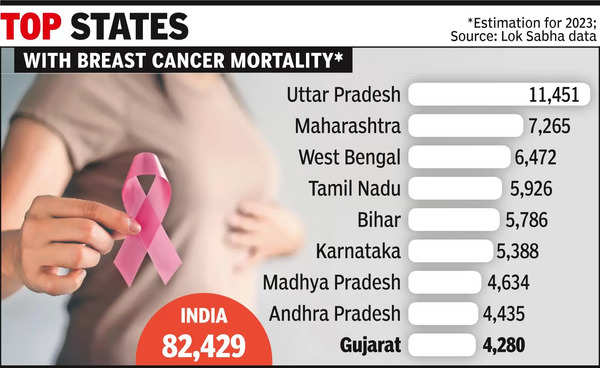
Ahmedabad: From 2014 to 2023, the mortality from breast and cervical cancers has increased by about 27% in Gujarat, indicated estimates tabled in Lok Sabha recently. The ratio was closer to the national average decadal rise of about 26%. In absolute numbers, Gujarat ranked ninth in India on mortality from both cancers, indicated data.
The data was part of answer by MoS Prataprao Jadhav for the question by MP Shafi Parambil.

According to the data, the annual mortality due to cervical cancer rose from 1,393 to 1,781 between 2014 and 2023, whereas the numbers rose from 3,355 and 4,280 for breast cancer during the same period.
Experts pointed out that the data is primarily extrapolation of cancer-related data from the registry maintained for Ahmedabad in terms of region and years. “There is no apparent rise annually in the prevalence of cases, but one must consider factors such as rise in population and rise in patients coming to medical setting for cancer screening and treatment. The numbers, thus, should be seen as a caution for better understanding of prevalence,” said a city-based oncologist.
Dr Shashank Pandya, director of Gujarat Cancer Research Institute (GCRI), said that even today, two-thirds of the cancer cases in general come at an advanced stage. “Thus, we request women for self-examination for early identification of breast cancer. After the age of 40 years, women should also go for annual mammography examinations.”
We also published the following articles recently
Punjab witnessed a considerable rise in breast and cervical cancer cases in the last decade, leading to 31,879 deaths from 2014 to 2023. The Indian Council of Medical Research highlighted the urgency for early detection and better healthcare. Government initiatives, including vaccination programs and an NCD portal, aim to address this alarming trend.
A 2019 study revealed that 30% of breast cancer patients experienced metastasis during follow-up care. Metastatic breast cancer can spread to bones, liver, lungs, or brain. Focus on survivorship includes extending life and enhancing quality, considering factors like daily life, side effects, and emotional well-being. Advanced therapies offer better outcomes, reducing recurrence risk, and improving patient satisfaction.
The incidence of skin cancer in India has seen a recent increase, driven by urbanization, changing lifestyles, and occupational hazards. Limited awareness and healthcare access exacerbate the issue. Essential measures include education campaigns, promoting sun-safe behaviors, occupational safety regulations, and improved healthcare access, particularly in rural areas.







